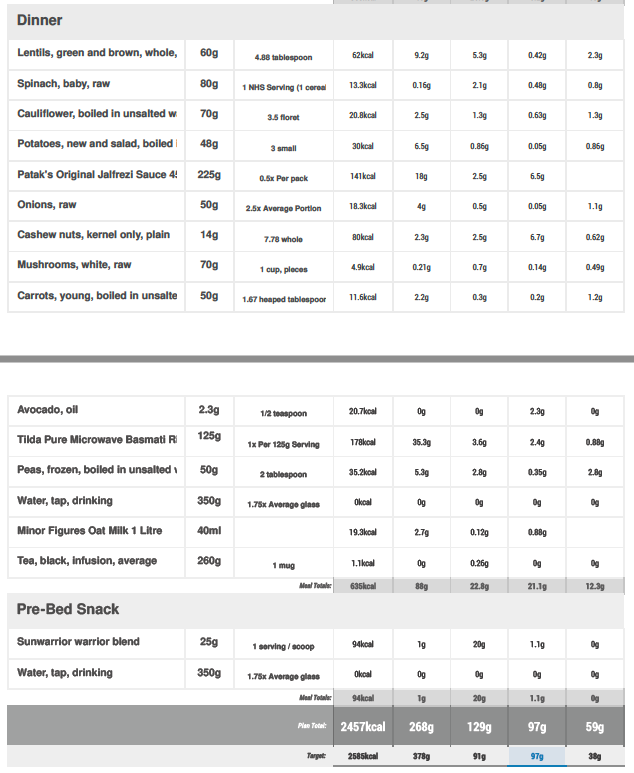Plant-Based Athletes: High Protein one-day meal plan.
This meal plan below outlines some ideas of how to reach your protein needs each day on a plant-based diet. The meals across the day provide a good range of all essential amino acids. The total amount of protein is timed evenly across meals and snacks, and the total amount is 129 g. This meets the current recommendation of 1.8 g per kg of body weight for endurance athletes. Additionally, the increased protein at dinner further supports athletic adaption, this would be a good meal to eat after an exercise session. The plan is based around an average 70kg athlete. If you are heavier or lighter, then increase or lower snacks to meet the energy needs for your weight.
The meal plan also shows that those on a plant-based can eat an enormous amount of food across the day and not take in excess calories (based on resting metabolic rate and physical activity averages). Plant-based meal plans such as this also provide an abundance of vitamins and minerals. Fibre is an important component in the diet and has been linked with a range of associated health benefits, such as increased cardiovascular health and lower cholesterol. In addition, fibre acts as a pre-biotic in the gut, helping to feed gut microbiota and keep the gut healthy. Gut microbiota feeds on fibre and produces short-chain fatty acids, these have been associated with increased performance (and health) in some athletes recently.
However, this meal plan is very high fibre, which may cause more gas when training - therefore, replace some foods with lower fibre options. As an example, this meal plan uses white basmati instead of whole grain. As an athlete, the key is to ensure you eat in the context of your training.
This meal plan is lower in carbohydrates. For athletes, I would not recommend a low-carbohydrate diet, and anyone running at least one hour per day should be eating a minimum of 5 - 6 g of carbohydrates for every kg of body weight. For a 70 kg athlete, this would be 350 - 420 g of carbohydrates per day. Anyone training above this duration, or at more intensity should increase total amounts of carbohydrates. This plan does not take into account daily exercise, so add in the additional energy as carbohydrates to meet your needs.
High Protein Plant-Based Diet Breakfast
High Protein Plant-Based Diet Lunch
High Protein Plant-Based Diet Dinner
Breakfast: Mix everything together for a good range of amino acids, healthy fat and fibre.
Morning Snack: Take a morning snack of some roast nuts and beans.
Lunch: Mix up all the ingredients with some extra virgin olive oil and harissa and serve as a salad with quinoa. If you are training that day, then turn it into a burrito and load it all up into a large white tortilla.
Afternoon Snack: Have a sandwich to take the edge off the afternoon. If you are training after this, then change the bread to white bread. this will set you up for your exercise session. Make sure to train more than 2 hours later.
Dinner: Curries are the best way of taking in lots of veg and beans. You’ve just finished your training session, so this is super quick and easy, simply fry an onion, add some garlic and ginger, then add all the ingredients, just use packets and tins, then add the curry sauce and leave to simmer for 20 minutes. Serve with rice.
Pre-Bed Snack: Have a protein shake before you go to bed to meet your daily targets. I've suggested a brand here, but others are also very good. Pea, wheat, soy and potato protein are all very good. Another brand to try is Form nutrition.
For any nutrition help and guidance, send me an email or schedule a free consultation using the link on this page.




